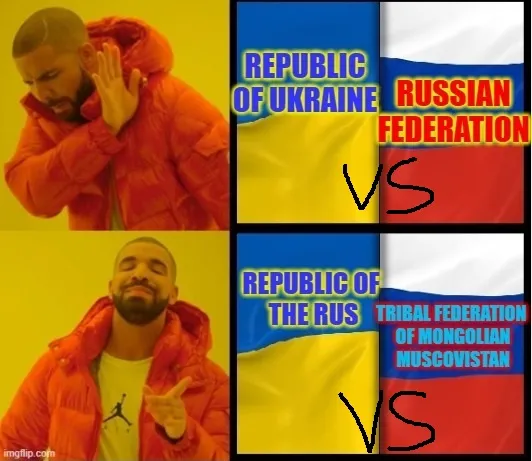
"Ukraine has never had its own authentic statehood. There has never been a sustainable statehood in Ukraine."
-Vladimir Putin, 22 February 2022
"Alone in the world, we [Russia] have given nothing to the world, learned nothing from the world, and bestowed not a single idea upon the fund of human ideas. We have not contributed in any way to the progress of the human spirit, and whatever has come to us from that progress we have disfigured."
-"What Is Russia," by Petr Chaadaev, ca. 1846(1)
Most people with a cursory knowledge of Western history have heard of the "Holy Roman Empire," an Austro-Germanic polity whose borders and ruling dynasty were in constant flux but which, in some form or another, attempted to dominate most of Europe for the better part of a thousand years. Its name is something of a joke among historians, considering that it was far from Holy, rarely ever included Rome, and for most of its lifespan, wasn't much of an empire. It called itself "Roman" purely out of a desire to gain some form of legitimacy by establishing extremely dubious links between itself and the empire of the Caesars.
It's ridiculous, really. I mean, how can you call a nation "Roman" when it doesn't include Rome?
Well... kind of the same way you call a nation "Russia" when it doesn't include the lands of the Rus.
Everyone in the world has heard Vladimir Putin's claim that Ukraine never existed as a state until Vladimir Lenin created it in the 1920's. By now, sycophantic Russophiles in India, Serbia, and swaths of the Middle East are shotgunning this claim all over any social media discussion of the Russian invasion of Ukraine, in their sad attempts to portray Russia as a hero simply reclaiming what is theirs while casting Ukraine as the aggressor, with some sort of nebulously defined backing by the equally nebulously defined bogeyman, "The West." Indeed, I have even heard this claim repeated here on Peakd by sources who, this glaring oversight notwithstanding, seemed otherwise reasonably aware and informed.
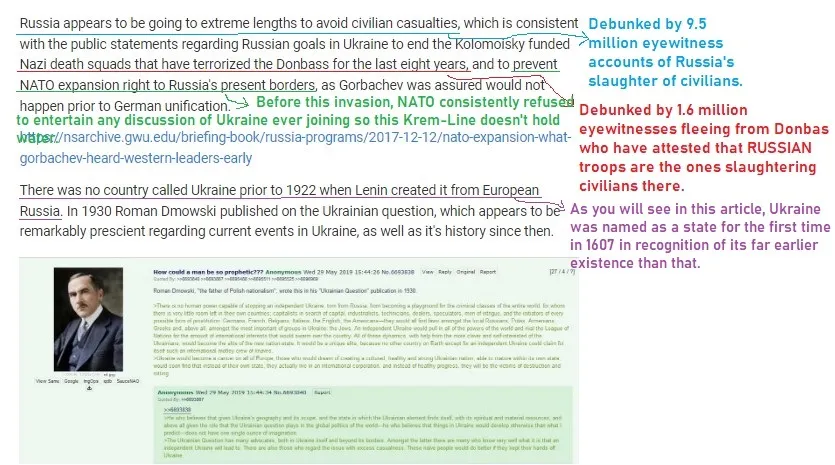
In all fairness, the "Russia is taking steps to avoid civilian casualties" statement did LOOK like it was true in those first few days of war, before the Russians realized that they were NOT going to be welcomed as "liberators" and switched gears to "if you won't welcome us then we'll simply slaughter you all."
Unfortunately for Russophiles, history proves that the nation currently called Ukraine not only DOES exist, but existed long before the nation currently called Russia. In fact, the very same Ukrainian state whose existence Putin denies, is one of the two parent-states (an estranged one) from which the erroneously-named "Russian Federation" sprang.
It Was Called "KYIVAN Rus" Because It Was Established In Kyiv
One thing Vladimir Putin gets right is that the "Russian" Federation, Ukraine, and Belarus do all trace their origins back to a single state. That state was Киевская Русь (Kyivskaya Rus), founded in 862, when the Slavic people dwelling between the Bug, Pripet and Dnieper Rivers sent word to a Varangian (Viking) prince named Ryurik asking him to come lead them and put an end to their tribal infighting (Hosking p. 1, Galeotti p. 3). The origin of the name is telling. The word "Rus" has several possible origins but Galeotti (p. 6) asserts that it is the Slavic pronunciation of Ruotsi, the Finnish word for Swedes, since the Slavs believed their Viking overlords came from Sweden. And of course, "Kyivskaya" is the Slavonic word for "Kyivan," the geographic adjective meaning "of Kyiv" or "from Kyiv." The reason for this is because the capital city of this newly established kingdom, whose lands roughly consisted of the northern half of present-day Ukraine, all of Belarus, Lithuania, Estonia, and the Russian oblasts along their Western frontier, was established in -and ruled from- the city which was by far the greatest within its borders: Kyiv (2). Kyivan Rus was a federation of semi-autonomous principalities under the suzerainty(3) of the Grand Principality of Kyiv, with local princes doing their own thing so long as they payed tribute (despite the imperialistic term it would be more accurate to say "taxes") to the Grand Prince of Kyiv and followed his decisions regarding war and peace. In theory local princes made their own laws, but in reality Slavic custom dictated a surprisingly uniform set of rules from one principality to the next.
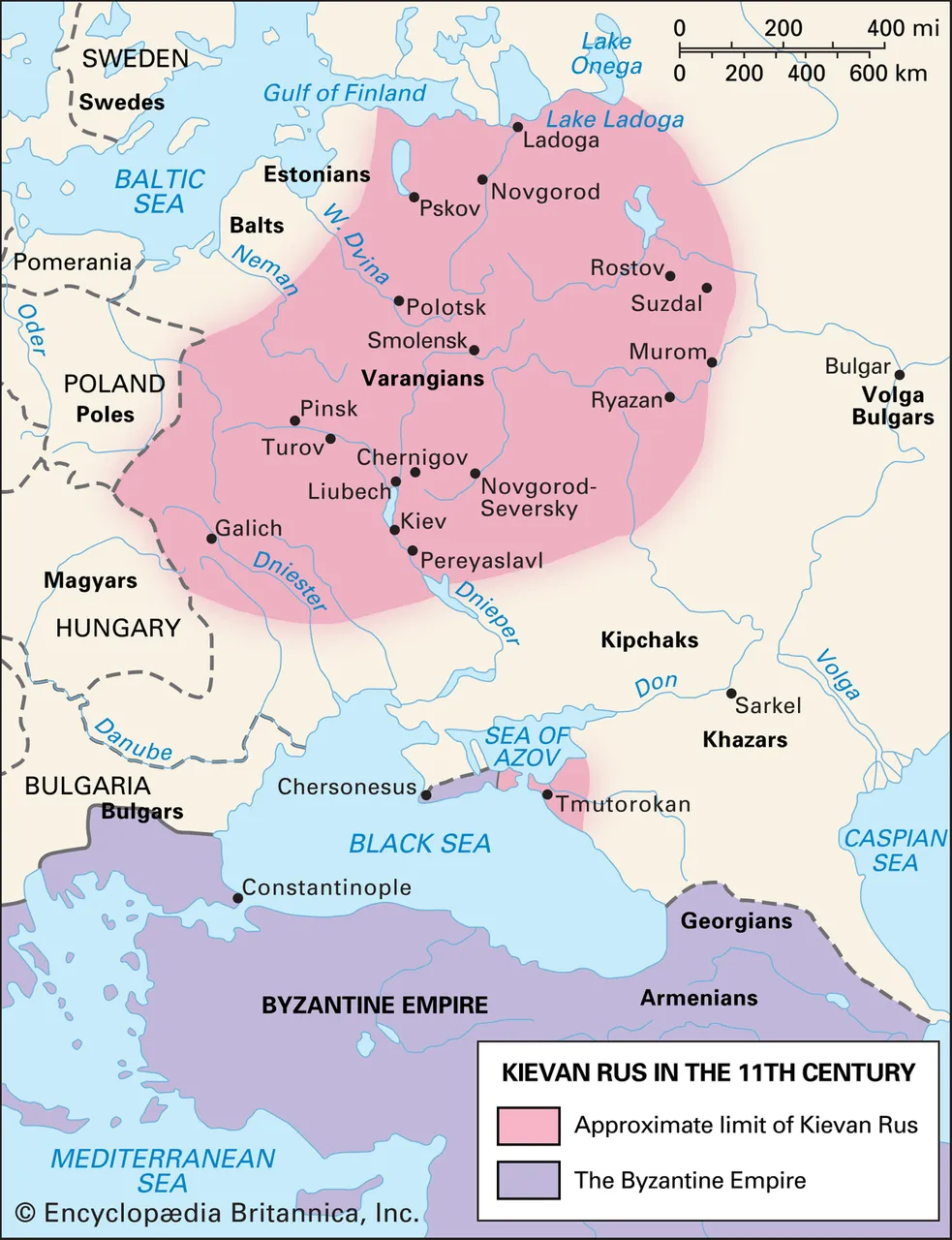
This city would remain the beating heart of the Land of Rus for centuries. Its place as the economic and political center of the kingdom was already established, but it would be Volodomyr the Great (r. 980 - 1015) who would make it the spiritual center of the kingdom as well by making Byzantine Orthodox Christianity the official religion of the entire kingdom, establishing the Patriarchate of Kyiv as a parallel to the one in Constantinople (Galeooti p. 9 & 10, Hosking p. 18). Thus, as Hosking writes, "Ultimately, they were all part of one Rus community; they looked to Kiev as not just a prize but also a centre of their culture, faith and identity (p. 16)." Even Russian hypernationalist Vladimir Putin has acknowledged this truth; that the spiritual forebear of what he calls "Russian" civilization was a Kyivite (Pearce).
Now, at this point a reader might ask "wait a minute. If this was Rus, the forebear of Russia, why was it ruled from Kyiv instead of Moscow?"
The answer is "uh... instead of where?"
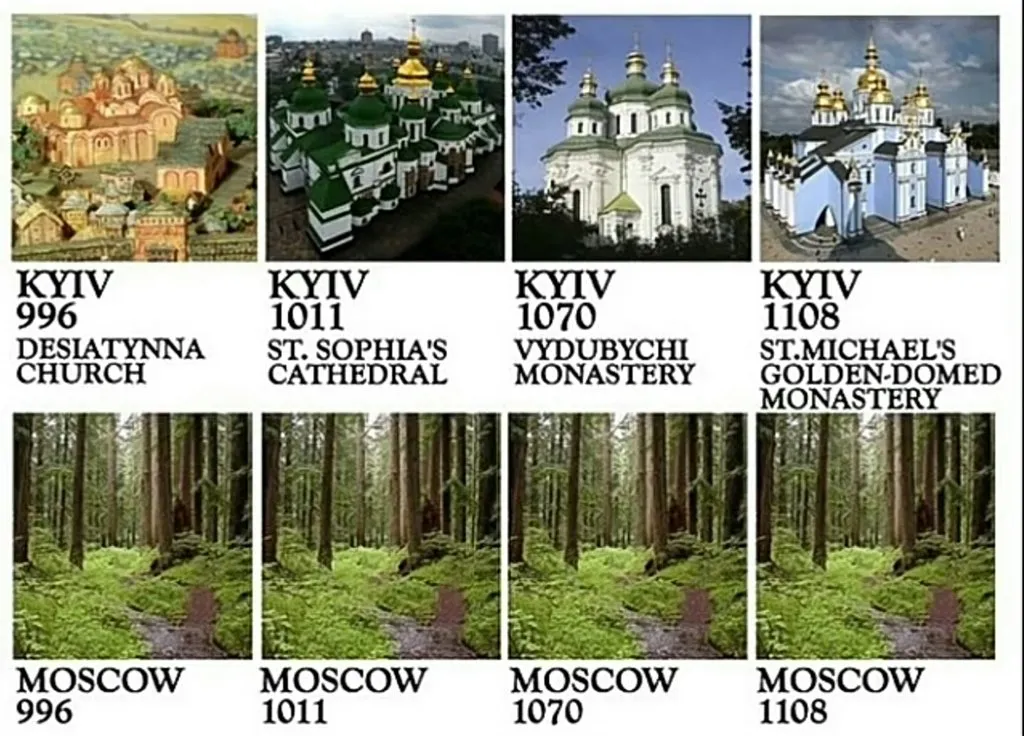
The federation of principalities known collectively as "Kyivan Rus," or in some sources "the Khanate of Rus (Hosking p. 33)," had already thrived for nearly 3 centuries, dominating the Intermarium and the Western Eurasian Steppe and even becoming the northern partner/rival/counterweight of their southern neighbor, the mighty Byzantine Empire (Galeotti p. 8) (4). Eventually, their East neighbor, the Cuman and Kipchak Khanates, grew to be enough of a threat that a fortress was needed on the Moskba River, both to facilitate trade between the Oka and Volga Rivers and to defend against nomad incursions from the East. To this end, an order was written establishing a fortress on the banks of the Moskba River. This fortress was given the name "Kremlin (French, Murrel & Ioffe)," and so was born the city of Moscow, first documented in 1147.
One cannot compare this city's origins and purpose against its later history without feeling a twinge of irony.
The Mongolian Principality of Muscovy
Perhaps above all, the irony is that it was the Mongols who enabled the rise of what had previously been a petty little hunting-lodge village into the heart of the new Russia: Moscow.
-Galeotti, p. 28
An associate of mine, @goldgrifin007, once said to me that his people, the Koreans, see Russia and China as sister empires with parallel history. After reading of the rise of Muscovy, I'm forced to admit he's right, and there's a reason why. The People's Republic of China and the Russian Federation (which, I remind the reader, is inaccurately named as this paper seeks to show) both trace their lineage to the Genghizid Conquest.
When other cities of Rus like Kyiv and Novgorod were at their height, looking for all the world like precursors to the later city-states of Renaissance Italy, Moscow was a lawless frontier garrison, used by the Grand Prince of Kyiv much the way Siberia was later used by the Soviets. When incorrigible rebels proved incapable of living in civilized society, they were offered a choice: execution, or exile to Moscow. The city was such a pit that most chose execution, but a few thousand who lacked the courage to face death and had little enough pride to be willing to eke out a living in the harshness of the Eurasian frontier, became the population of Moscow.
And so things remained for a while. However, what none of the Princes of Rus realized was that the Cuman and Kipchak Khans were not expanding into the lands of Rus. They were fleeing there, before a new and far greater threat from the East: the Mongols. In the 13th century, these invaders from the East swept into the lands of Rus, destroying cities in their wake. Kyiv was sacked with greater-than-usual brutality, and 48,000 of its 50,000 people were killed. Not a single political, cultural, or economic entity that could tie together all of what had once been Rus survived this invasion except the Orthodox Church. Rus, as it was before, ceased to exist, and in its place was nothing more than the local administrative system of the Mongolian Empire. Not one major city of the Rus thrived under Mongol rule except one, which survived by eagerly licking the boots of the new foreign conquerors rather than resisting them.
Looking at a map of the Principalities of the Rus, one may notice Muscovy is not among them. This is because it did not exist until the Mongols created it and named Moscow's prince, Ivan Kalita, as its "Grand Prince," echoing the former title of the ruler of Kyiv in return for his loyal and devoted service to his new overlords (Glenn), even acting on their behalf to collect tribute from his countrymen (Hosking, p. 71).
After Genghis Khan's death, the Mongol Empire had split into four separate "hordes," shown in the map below.
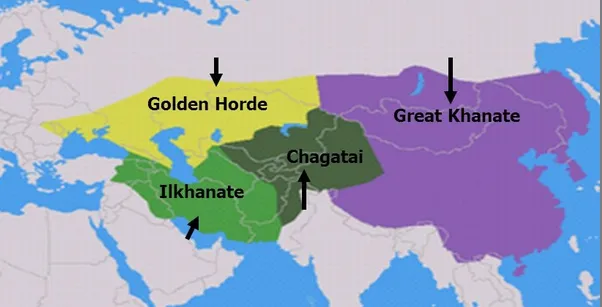
One was the "Khanate of the Great Khan," ruled by Kubilai Khan from his capital at Dadu (present-day Beijing). Since the majority of the conquered Mongol subjects of this Khanate were Chinese, its ruler gave it the Chinese character "Yuan," meaning "Universal" as its name. Since this character was Chinese, China's historians today erroneously claim this Mongol Khanate was a "Chinese Dynasty," in order to avoid admitting that China ceased to exist for several centuries and was a colony of its northern neighbor. Two others were the Chagatai Khanate (roughly the "istans" of the former Soviet Union) and the Ilkhanate (which became the core of a reborn Persian Empire later). The last was the "Golden Horde (Johi Ulus in its native tongue)," which ruled roughly the Eastern half of Ukraine(5) the southwestern part of Russia (including Moscow), and the Caucasus, from its capital at Sarai, located on the site of present-day Tsaraev, Russia)...
..And this state, a Mongol state, rather than Kyivan Rus, is the earliest ancestor of the modern day Russian Federation.
Typical Mongol policy was to leave local rulers in power but strip them of any relevant authority and appoint Mongol officials to collect tribute and troop levies on behalf of the Mongol overlords. In the conquered Rus, however, the Mongols found a collaborator willing to perform this duty for them so faithfully that they didn't have to. The Prince of conquered Moscow performed these services so well that the Mongols left him in place (Hosking, p. 71), thus marking him as no longer of Rus, but of Mongolia. In 1389, the reigning Muscovite prince made clearer still that he (and his principality) were no longer of the Rus but of the Mongol Horde when he broke with Rus's traditional manner of succession and named his eldest son his sole successor, as per Mongolian tradition. His Mongol overlords approved (Hosking, p. 71). The Slavs of Rus, did not.
The importance of this time of Mongol rule cannot be overstated. In terms of political structure, filial inheritance rights, government procedure and civil administration, everything the Ryurikid Dynasty brought to their kingdom of Rus was replaced by Sino-Mongolian structures (Galeotti, p. 43). The Golden Horde was an Asiatic state, and Muscovy, forsaking any ties it had with ancient Rus, was a full-fledged willingly participating member of it.
And for this reason, their faithful and sycophantic collaboration with their East-Asian conquerors, up to and including adopting their overlords' culture, traditions and customs at the expense of their own, the princes of Moscow were named "Senior Princes of the Lands of Rus" by their Mongol masters. Thus, Moscow, built by Kyiv's order on the eastern frontier of the Rus to defend the Rus against Eastern nomads, populated with the criminal dregs of society who were not civilized enough to live in the rest of the Rus, became the tool the Mongols used to subjugate the Rus, eventually forsaking its Russian roots and becoming Mongolian itself.
The Dog Bites the Hand that Fed It
In time, the Golden Horde began to decline in power. A Muscovite Prince named Alexander Nevskii sought to negotiate greater autonomy within the Horde. He had no intention of throwing off the Mongol Yoke. He just wanted to move a little higher up in the Mongol pecking order (Hosking, p. 41). What follows is a bit reminiscent of Stephen F. Austin's delegation to Santa Anna before the Texas Revolution. A loyal subject, seeking greater autonomy, set off a paranoid ruler's fears of rebellion, and the ruler responded by sending an army, thus leaving the loyal subject with no alternative but to launch precisely the rebellion he intended to avoid. He rallied Muscovy's troops and those of a handful of smaller cities of Rus (though not many, as Galeotti rightly points out that the other cities of Rus had reason to distrust Muscovy's ambitions (p. 41)) and defeated a tiny Mongol expeditionary force at Kulikovo in 1380.
Russian National Mythology likes to portray this battle as the rebirth of Russia, liberated from Mongol oppression by the bold defiance of courageous Russians under Dmitriy Donskoi, proud Russian patriot. There are two problems. The first is that we've already pointed out Donskoi was a Mongolian patriot, loyal to the Khan of Sarai. The second is that this battle didn't free Rus at all. Less than a year later, the Khan of Sarai sent a larger Mongol army to Muscovy and forced an all-too-willing Donskoi to submit once again to Mongol rule (Galeotti, p. 42).
The reality is, even well into the 1400's, the princes of Muscovy continued to travel to Sarai seeking their Mongol overlords' permission before ascending the throne of their own city. The first Muscovite prince not to make this journey was Ivan IV, the first to call himself "Tsar of All the Russias."
Empire of the What?
As the Golden Horde began to decline, Ivan IV (Ivan the Terrible) set out to fill the power vacuum left in its wake, and he did this mostly by expanding his rule to include a lot of nomadic Khanates who served the Mongols and didn't really care where their tribute went as long as the one who collected it provided order. This included Rus's old rivals, the Kipchaks to his East. It would not be until much later in his reign that Ivan thought to perhaps try and unite a few cities of the Rus under his banner. Indeed, early on in his reign, Ivan didn't refer to himself as "Prince" or "Czar" or "King." He preferred the Asiatic term "Khan," referring to his domain as "the Khanate of Muscovy (Hosking, p. 85)," claiming, without much legitimacy, to be the heir of Genghis Khan's line (Hosking, p. 100-101).
Ivan soon realized that if he wanted to be taken seriously by his more powerful western neighbor, the Polish-Lithuanian Commonwealth, he needed a title for himself and his domain that didn't have "I'm a primitive savage ruling a mob of primitive savages" written all over it.
Fortunately for him, the Byzantine Empire -heirs of Rome- had fallen to the Turks a generation prior. More fortunately, Ivan's mother was one of the Byzantine Emperor's daughters (Galeotti, p. 50). This gave Ivan the claim he needed, loose though it was. In 1547, 680 years after Ryurik founded Kyivan Rus, Ivan of Muscovy declared that with the fall of Constantinople, he, as the son of a Byzantine princess, was the heir to the Roman-Byzantine lineage and was now Caesar, or Tsar, as it's pronounced in Proto-Slavic (Andreyev). But declaring himself the heir of Caesar wasn't going to carry much weight if all he ruled was a former Kyivan border garrison and a bunch of the nomads that garrison failed to protect Kyivan Rus from.
He needed to lay claim to the lineage of an ancient kingdom as well. And so, he declared that his city-state, Muscovy (Moscow) was the rightful ruler of all the lands of the Rus. As justification of this statement, he cited (of course) generations-old Mongol decrees stating just that. Thus, he named his State "Empire of the Rus," or "Rus-si-ya" for short.
Ivan was well aware that neither his state nor his dynasty had any legitimate claim of lineage to per-Mongol Rus (Hosking, p. 100), but why should that have been a problem for a state which had earlier claimed to be the heir of Genghis Khan's empire, on no basis other than "because we were proud members of one of the four hordes it split into?" Ivan thus declared Muscovy to be the seat of power of what he claimed was a reborn Rus.
By the time all was said and done, Ivan had appropriated (with exceedingly dubious legitimacy) a royal title from Rome (an Empire whose borders never included his capital city), and a national name from Rus (whose borders barely included his city).
In other words, a Mongolian prince, of a Mongolian city, with well-established Mongolian political and social traditions, declared himself the heir of a Roman lineage, and cited Mongolian occupation orders, to say he was the the rightful and God-sent ruler of a nation whose farthest frontier barely extended to his city and which had been destroyed by Mongols, and enslaved for generations with the help of his own proudly-Mongolian forebears.
And so was born the Kingdom we now, quite questionably, refer to as "Russia," rather than its more accurate title, "Mongolian Muscovistan." This "Russian" State did not attempt to define a national identity, or any definition of what it meant to be "Russian" other than two core traits: the Greek Orthodox Faith, and devotion to autocratic government (Hosking, p. 181). The distinction between Rossiiskii (the Russian Empire) and Russkii (the Russian ethnicity) persisted well into the 19th century(Hosking, p. 218) and no conception of Russkaya (Russian nationality) has yet been formed at the time of this writing in 2022, though Vladimir Putin is attempting to form one and using the former Soviet Union as its basis.
So, having examined the origins of what the modern world erroneously calls "Russia," it begs the question of what happened to the core of Kyivan Rus. The answer is, it became present-day Ukraine.
Meanwhile, in Kyiv...
The Mongol campaign against Kyivan Rus, as it has already been stated, left most of its major cities in ruins, with entire city populations slaughtered en masse on occasion. Though unlike Moscow and the Easternmost frontier, most of Kyivan Rus did not remain under Mongol jurisdiction for long. The Mongols' rule receded with the fragmentation into four hordes, leaving most of the lands of Rus first free, and then eventually annexed by their Slavic cousins, the Polish-Lithuanian Commonwealth. During the 13/1400's, as Moscow was busy ingratiating itself to its new Mongol overlords and assimilating eagerly into their culture, Hosking writes, "...Lithuania-Poland was much the largest territorial state in Europe. Its land extended as far as the Ugra and Oka Rivers just west of Moscow, and southward down the Dnieper to a small and precarious foothold on the Black Sea between its estuary and that of the Dniester (p. 60)."
What the reader may notice is that this amalgamated state, ruled alternately by Lithuania/Poland, bears a closer geographic similarity to Kyivan Rus than Ivan's "Empire of the Rus" did, and certainly included more of Kyivan Rus's old heartland than Ivan's "Rus" did.
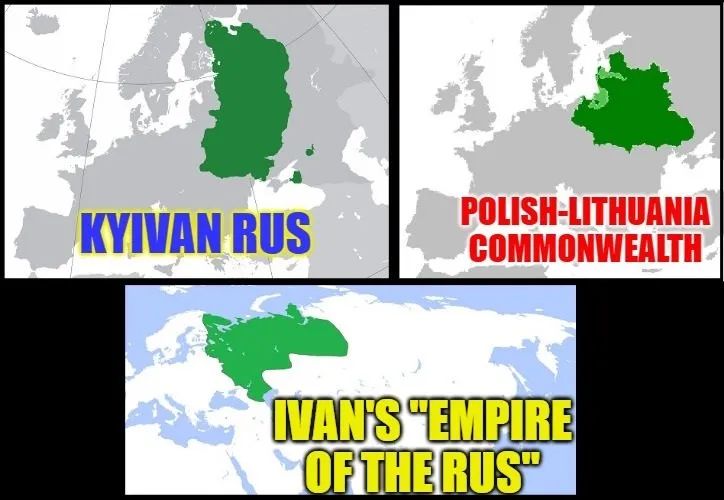
As to its inhabitants, they preserved Old East Slavic, the language of Kyivan Rus, far more completely than their estranged Muscovite brethren did. While Muscovy's "Russian" language picked up a large amount of Sino-Tibetan and Turkic influences, the population of the Kyivan cities now under Commonwealth rule stuck closer to their original tongue. Their language eventually split into Ruthenian (ancestor of modern Ukrainian) and Rusin (the ancestor of modern Belorussian) (Hosking, p. 60). It's not hard to see how both languages' names are derived from the word "Rus."
Though they never fully assimilated into the Polish-Lithuanian culture. Deprived of the cities that had been their home, the inhabitants of these lands took up a life that was likely the inspiration for the Fremen of Frank Herbert's Dune. They established a semi-democratic society based on military discipline, living in hidden camps. Each camp, or sech, had a leader, or hetman, who was elected by all the able-bodied males of military age. They adopted a name for themselves derived from the Turkish word for "Free man." This word was "Kozak," the linguistic forebear of both "Cossack" and "Kazakh."
These Cossacks (who by this time were beginning to grow restless under Polish-Lithuanian rule, (Hosking, p. 163)) made a name for themselves as warriors, defending persecuted Orthodox believers against both Catholic and Muslim oppression. They were recognized for this by the Orthodox Metropolitanate of Kyiv, who called them "descendants of Glorious Rus (Hosking, p. 162)."
The Muscovites, watching from far in the East, fumed with jealousy. How dare a priest in the capital of the Rus, claim that the descendants of the population of Rus, living in lands belonging to Rus and defending the faith that was central to Rus, were descendants of the Rus? Didn't he know that only the Mongolian princes using bastardized Roman titles in a state formed on the fringes of old Rus could claim such a lineage?
I Don't Think "Borderland" Means What You Think it Means
The Muscovites of the so-called "Empire of the Rus" were concerned. Their entire legitimacy was derived from the claim that their kingdom was Kyivan Rus reborn. If the population of the actual Kyivan heartland got organized and laid claim to this lineage themselves, it would be bad for Muscovy's image, and this was at a time when they were desperate to distance themselves from their Golden Horde heritage. Since the Cossacks inhabiting what had once been Kyivan Rus were now living in the contested lands on the border between Ivan's "Rus" and Poland-Lithuania, the Muscovites began to use the word "borderlands" as if it was the actual name of the Cossack homeland. And of course, the word for "borderland" in the proto-Russian tongue used by Muscovy at the time was Ukraina.
This was confirmed in official government records by two treaties between the Tsar and a Cossack leader named Bogdan Khmelnitskii. The first, the Treaty of Pereiaslavl (1654) was the treaty whereby Tsar Ivan IV pledged military protection to the Cossack State (though Khmelnitskii was insulted when the tsar's envoy flatly declared "the tsar cannot bind himself by oath"). The second was the 1667 Treaty of Andrusovo, whereby
Tsar Ivan IV formally recognized the existence of a Cossack state known as the Hetmanate of Ukraina (6) (Hosking, p. 164)!
This recognition, when taken together with the above evidence that the Cossack state held a far more direct lineage back to Kyivan Rus than Ivan's "Empire of the Rus" did, leads to the inescapable conclusion that not only does Ukraine have actual statehood, but as the legitimate successor to Kyivan Rus, the Ukrainian state predates the "Russian" one by centuries.
So, Whence Cometh the "Russia and Ukraine Are One" Claim?
For clarity, from this point forward, use of the term "Russian" refers not to Kyivan Rus, but to the modern sense of the word "Russian;" that is, from the Muscovite State currently known as "Russia." References to the state derived from the Cossack host of Kyivan Rus will use the term "Ukrainian."
In the late 19th century, the "Russian" Empire had a problem. The ethnic group who claimed to be its ruling body, ethnic "Russians," were a minority in the "Russian" Empire, making up a mere 44% of its population (Hosking, p. 335). With ethnic rebellions flaring up all over the empire, and with the rising European trend toward state polities being defined along ethnic and national, rather than imperial lines, this presented a problem for a sprawling, multi-ethnic and (more importantly) multinational empire that had never truly forged a national identity for itself (Hosking, p. 181 269 - 279, 286, 299) other than "we are those who serve the tsar and believe autocracy is the will of God." The leaders of the "Russian" Empire, despite a centuries-long tradition of being a bit obtuse, had the good sense to realize that the "Russian" Empire would have a better chance of survival if "Russians" were a majority.
What was their solution?
To declare that the second-largest ethnic group in the empire, Ukrainians, were in fact ethnic Russians, thus making "Russians" the majority of the empire, at 62% of its population. To this end, the government of the "Russian" Empire began issuing decrees denying the existence of a separate Ukrainian national identity. In 1876 Interior Minister P. A. Valuev warned the tsar that enabling the world to learn that Ukraine had a separate literary body written in its own language would pose a risk of Ukraine gaining the same nation-statehood that was becoming the norm in Europe, which of course the government in Moscow couldn't abide (Hosking p. 336). In response, Tsar Alexander issued a decree the same year making it a death penalty offense to print anything in Ukrainian (Applebaum, p. 8), which established Moscow's precedent for answering what they called "the Ukraine question."
This draconian precedent (deny that Ukraine exists, insist that a "Ukrainian" is merely a poorly educated "Russian," and kill anyone who says otherwise) has persisted into the present day.
Russia Isn't Rus; Ukraine Is
This article has deliberately avoided the (ongoing at the time of publication) Russo-Ukrainian War, except insofar as the rhetoric surrounding the Russian invasion which began it, is relevant to the historical question at its core. The question of "who is right and who is wrong" is one that I will address in political, rather than historical articles (though rest very well assured that I do have a clear and unambiguous opinion on the matter).
But it is undeniable that one of the issues at stake in it (or at least, the rhetoric being used by the initiating party to justify the invasion) is a question of national identity. As such, it is necessary to, as the Chinese like to say, "rectify the names." The narrative that the "Russian" Federation, successor state of the Soviet Union and the "Russian" Empire founded by Ivan IV, is merely reabsorbing a long lost part of its own territory and somehow reuniting Kyivan Rus, is a notion that dies a rather swift and brutal death upon contact with empirically proven historical facts, as does the claim of Ukraine having lacked statehood prior to Lenin "inventing" it in 1922.
The Republic of Ukraine can be traced in a mostly unbroken line back to Kyivan Rus.
The "Russian" Federation's lineage leads back to a state founded by Kyivan exiles living on the fringes of Rus, who collaborated with the Mongols who invaded their homeland, and assimilated into the invaders' culture, who claimed of their own accord to be the successors of the Mongolian Jochi Ulus.
If one wanted to cast the "Russian" Federation's 2022 invasion of Ukraine in a historical light, a closer parallel would be the Mongolian barbarians' campaign against Kyivan Rus; a campaign of indiscriminate slaughter by an autocratic Asiatic state with a lineage leading back to nomadic raiders, carried out without provocation against a proud, noble, cultured and refined nation with western-style values, an egalitarian tradition, and a Judeo-Christian ethos.
(1) Petr Chaadaev (Anglicized renderings also include Pyotr Chadayev and Piotr Chaadayiv) was a retiree from one of the "Russian" empire's most elite guard units, and this essay was published in a journal that sought to define what the source of Russia's national identity was. His conclusion was "we don't have one."
(2) For those who are living under a rock, that's the capital of present-day Ukraine, commonly misspelled "Kiev" in an attempt to Anglicize the Russian mispronunciation of the original Slavonic name.
(3) "Suzerainty" is a concept that doesn't have a direct, exact analog in modern international law. The closest equivalent would be to say Hong Kong is under the "suzerainty" of China, Puerto Rico is under the "suzerainty" of the US, and Greenland is under the "suzerainty" of Denmark, though all of those examples fall a tiny bit short of the level of autonomy these principalities had. Another close (but imperfect) parallel would be to think of the US States as semi-autonomous principalities under the "suzerainty" of the city-state of Washington D.C. The actual status of “suzerainty” would fall somewhere in between the two.
(4) For those unfamiliar with history, the Roman Empire didn't fall at once. Its government divided it into two empires, thinking it was too vast to rule from one city. Its Western half fell to barbarians but its Eastern half, ruled from Byzantium (Constantinople), persevered until the 1400's.
(5) The Western half of what is today Ukraine, formerly the thriving core of Rus, was annexed after the fall of Kyiv by the Commonwealth of Poland and Lithuania, which (though it may surprise the modern reader) was one of the most powerful nations in Eurasia at the time.
(6) It is commonly claimed by Russian nationalists in modern times that this treaty did not recognize Ukraina as a state, since the terms of the treaty did place this state under the protection of Muscovy. Any credible historian will be quick to declare, however, that military protection and vassalage did not preclude statehood under the international order of the time, and not every "state" was a "sovereign state." A vassal state was still a state, with defined borders, laws, and separate political structure. For further information, see footnote (3).
Works Cited
Andreyev, Nikolay. "Ivan the Terrible. Britannica. 21 Aug, 2022. Web. 1 Oct, 2022. https://www.britannica.com/biography/Ivan-the-Terrible
Applebaum, Anne. Red Famine - Stalin's War on Ukraine. London, 2017. Penguin Books.
ISBN 978-0-141-97828-4
Baker, Sinead. "Putin denies planning to revive the Russian empire after declaring that Ukraine is not a real country and sending troops there." Business Insider. 22 Feb, 2022. Web. 26 Sept, 2022. https://www.businessinsider.com/putin-denies-reviving-russian-empire-says-ukraine-not-real-country-2022-2
Glenn E. Curtis, ed. Russia: A Country Study. Washington: GPO for the Library of Congress, 1996. http://countrystudies.us/russia/3.htm#:~:text=The%20first%20ruler%20of%20the,Vladimir%22%20from%20his%20Mongol%20overlords.
Edith W. Clowes. Russia on the Edge. Imagined Geographies and Post-Soviet Identity. Ithaca: Cornell University Press, 2011. xviii + 179 pp.
ISBN 978-080-1461-149
French, Richard Anthony; Murrell, Kathleen Burton; Ioffe, Grigory. "History of Moscow." Britannica.com. Web. 26 Sep, 2022. https://www.britannica.com/place/Moscow/History
Galeotti, Mark. A Short History of Russia - From the Pagans to Putin. London, 2020. Ebury Press.
ISBN 978-1-52910-638-1
Hosking, Geoffrey. Russia and the Russians - From Earliest Times To the Present. London, 2001. Penguin Books.
ISBN 978-0-718-19360-7
Pearce, James. "When Vladimir Took Kyiv and the Misuse of History." Moscow Times. 28 June, 2022. Web. 26 Sep, 2022. https://www.themoscowtimes.com/2022/06/24/when-vladimir-took-kyiv-and-the-uses-of-history-a78103